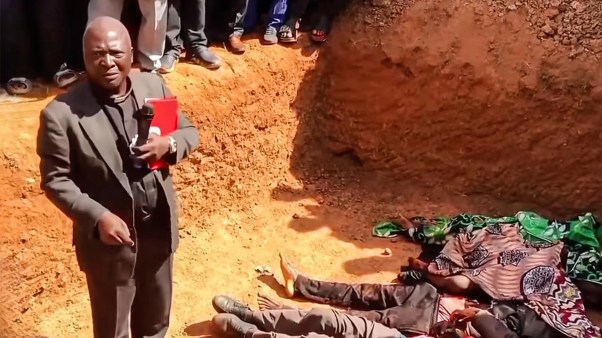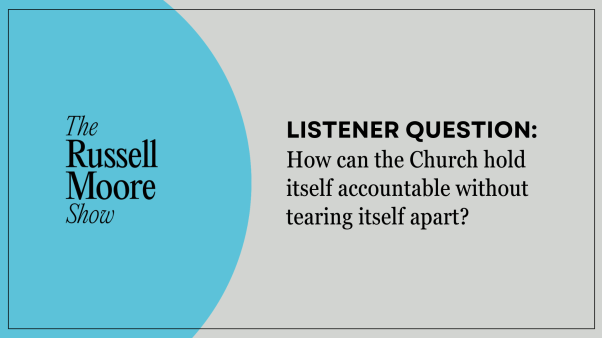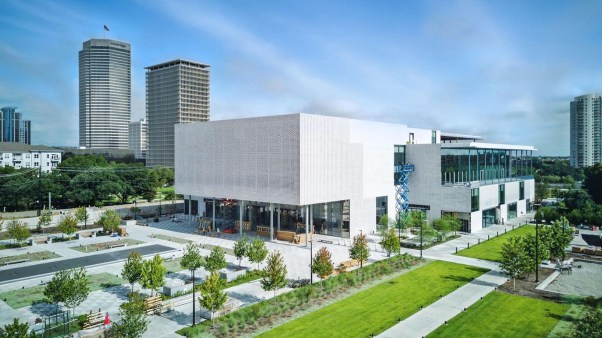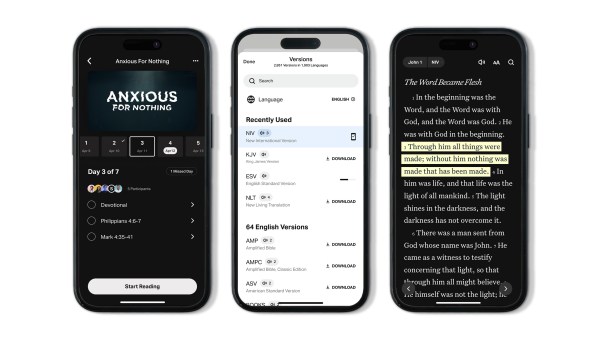The man and the message were proven and familiar, but when Billy Graham preached the gospel during Mission 89 in London, his campaign methods showed a decidedly contemporary and high-tech flair. “Teaser” posters and live satellite linkups to sites throughout Great Britain and in Africa helped bolster stadium crowds and made Mission 89 the biggest single outreach of the evangelist’s 40-year ministry.
Weeks before Graham hit town, Londoners were confronted by a puzzling series of ads. “E.ILF—Can anyone make sense of it?” billboards asked, until the solution to the puzzle was revealed: “LIFE. Come and hear one man who can make sense of it. Billy Graham.”
“The style is different from anything we’ve done in the past,” said team representative Bill Jefferson. “I think it’s more in line with the way you do things in Britain—soft selling.”
Near-capacity crowds filled London’s largest venues for 12 meetings during the June 14-July 1 crusade. Attendance at West Ham, Crystal Palace, and Earls Court totaled more than 306,000. The response prompted Graham to add an additional meeting at Wembley Stadium, canceling an appearance at the opening session of the Lausanne II Congress on World Evangelization in Manilla (see “Global Camp Meeting,” p. 39). In spite of torrential rain, more than 73,000 packed Britain’s largest stadium for the added event.
Satellite technology expanded Graham’s preaching presence to 240 Livelink locations. Each received live broadcasts of Graham’s Earls Court meetings. Each Livelink site was organized as an individual crusade, complete with sponsoring committee, counselors, and follow-up teams. Crowds at the sites boosted total attendance in Great Britain more than 1.2 million. According to crusade organizers, more than 80,500 indicated commitments to Christ.
Several Earls Court meetings were also carried live and by video rebroadcast on the national television networks of 30 countries in Africa. An estimated 22 to 30 million people watched each program, including more than 8 million who attended 16,000 separate crusades organized by African churches.
The transcontinental link was the first time such technology has been used to extend Graham’s reach to other countries in the developing world, said Bob Williams, Billy Graham Evangelistic Association representative who headed the Africa project.
And in Wales …
While Londoners were puzzling over posters that eventually led them to Billy Graham’s Mission 89, the residents of nearby Wales heard the preaching of evangelist Luis Palau. His five-week “Tell Wales” campaign ran from May through mid-June, culminating at the national stadium in Cardiff.
Wales presented a demanding challenge to Palau. According to crusade director Alan Johnson, after the area’s historic revival of 1904, led by Welsh preacher Evan Roberts, there developed an unusual spiritual barrenness. Although many may attend chapel regularly, few know a genuine relationship with Christ. “This nation was visited by God,” Johnson said, “but in subsequent generations its people have turned their backs on God.”
Rather than conduct large rallies at one location, Palau traveled through the isolated valleys of Wales, speaking in 17 different locations during the campaign. Palau delivered his messages in English, while prayers and hymns were offered in Welsh. In all, about 80,000 people attended the meetings, organizers said, and nearly 5,000 responded to Palau’s evangelistic invitations.
In spite of the proximity of the campaigns, the two efforts overlapped little. Only one site in Wales participated with Graham’s Mission 89. A Graham spokesman said his organization encouraged Welsh believers to participate in Palau’s efforts. And according to Johnson, the isolation of most parts of Wales meant Graham’s London meetings received little notice there.
Boycotts And Rumors
Graham’s efforts in Great Britain were actively opposed by Ian Paisley, the controversial Protestant churchman and politician in Northern Ireland, who criticized Graham’s cooperation with Catholics. Paisley took out advertisements in regional papers, calling for a boycott of the crusade.
Several British newspapers also reported that Graham had received death threats prior to the crusade, allegedly from extremist Protestant groups in Northern Ireland who condemned the evangelist’s links with the Catholic church. But Graham spokesman Larry Ross denied any threats were received. “I can say across the board that there were no death threats or threats of any kind prior to or during Mr. Graham’s time in England,” Ross said. Anti-Graham leaflets were distributed at some gatherings. Ross said he believes reports of such opposition were exaggerated into rumors of death threats.
Mission 89 was the 70-year-old evangelist’s eleventh in Great Britain. Noting that he had received invitations to many regions of the country, he said he would like to return, but added, “I don’t know how much longer God is going to give me strength to do this.”
“When the physical strength is lacking, the spiritual strength takes over,” he told the Wembley crowd. “I have to tap the spiritual power. That is what keeps me going.”










